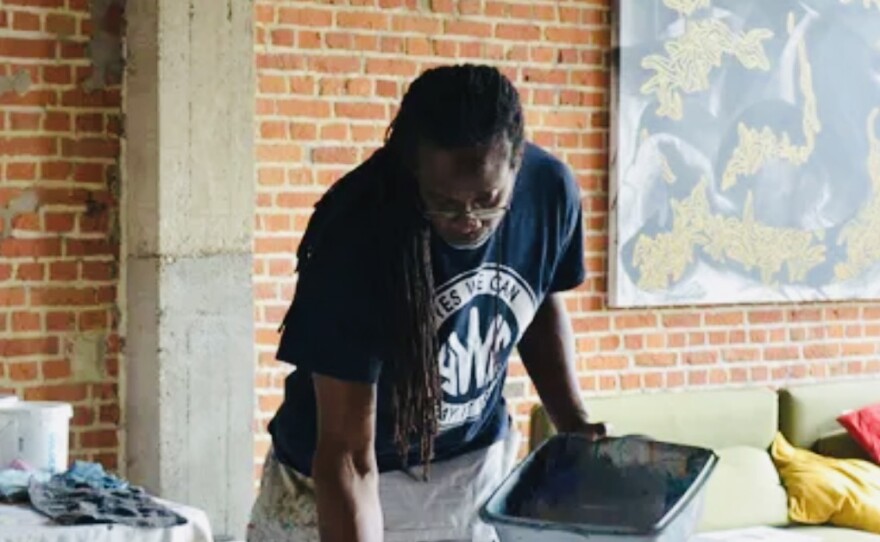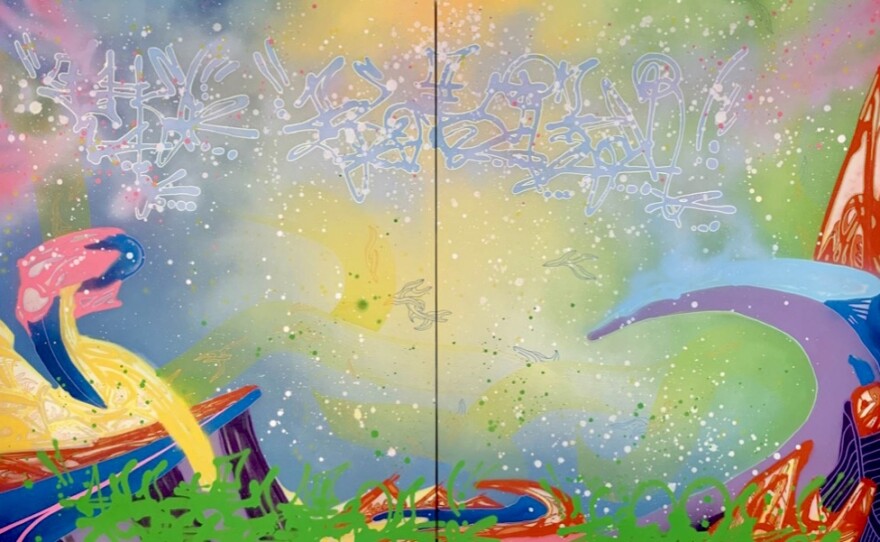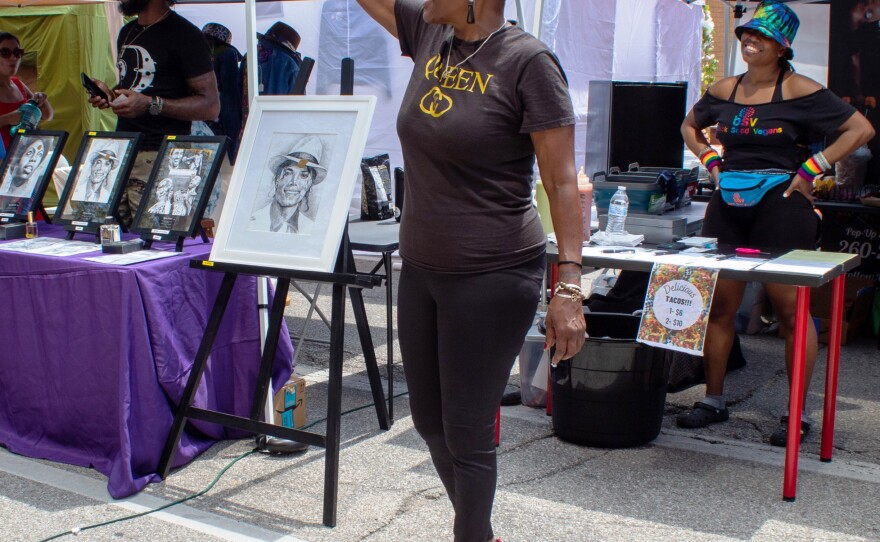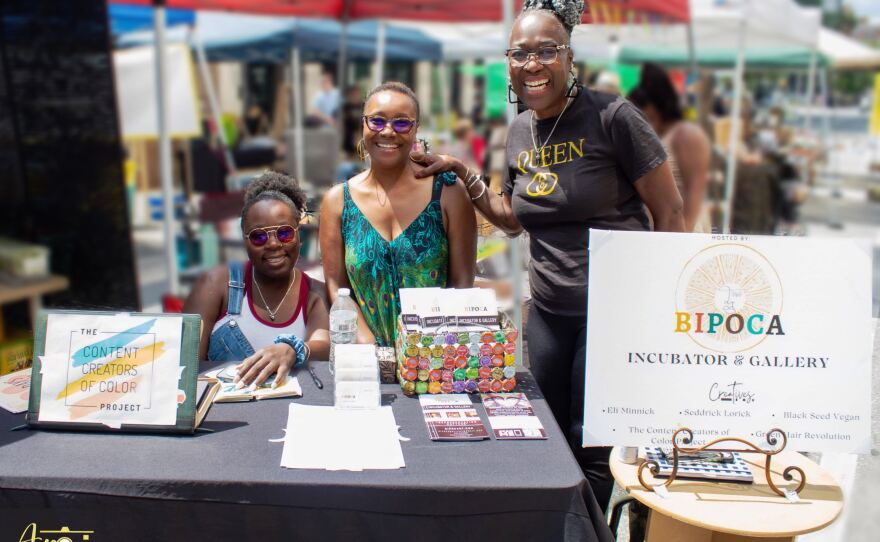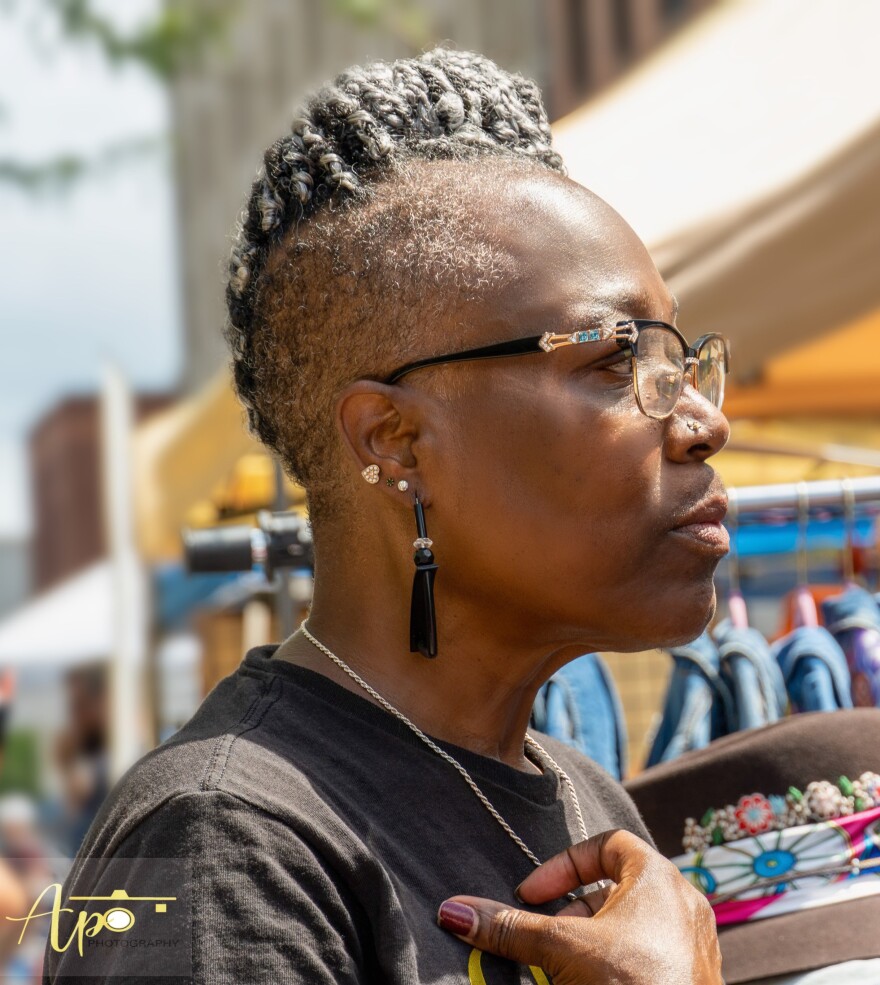
The BIPOCA Incubator and Art Gallery is kicking off its monthly Meet the Artist series this Friday, Oct. 7, with special guest, Kool Koor (core), pioneer graffiti artist from the South Bronx.
Surrounded by artists like A-One and Toxic, Kool developed his distinctive style riding on the subway trains to the Art and Design School in Midtown and continues to, in his own words, "constantly reinvent himself."
Housed in the Wunderkammer Company Art Space at 3402 Fairfield Avenue, BIPOCA focuses on black, indigenous, and people of color whose artistic creative work has been historically excluded, unseen and/or exploited.
WBOI’s Julia Meek discusses the group’s mission and Koor’s iconic body of work with BIPOCA founder & director, Clydia Early, as well as what such an opportunity will mean to our community.
Event Information:
BIPOCA 1st Friday Meet the Artist in the Incubator & Art Gallery
@ Wunderkammer Company, Fort Wayne
Friday, Oct.7, 2022
6:00 p.m. to 9:00 p.m.
Free Event, All Ages Welcome
Find more information and a complete listing of activities at the BIPOCA Facebook page.

Julia Meek: Clydia Early, welcome.
Clydia Early: Thank you. Hi.
Julia Meek : you have an exciting show coming up at your new BIPOCA Incubator and gallery Space. And before we talk about that, very, very briefly, what is it that you do there at your space that actually is in the Wunderkammer Company Art Gallery Space?
Clydia Early: Well, what we do at BIPOCA first and foremost, we focus on uplifting and promoting black, indigenous, and People of Color whose art, you know, their creative work has been maybe historically excluded, unseen, or exploited.
That's the first thing we do. So we particularly work with BIPOC artists, and we try to have community workshops there for them, we have a space for them to exhibit, we do digital art, we have pop-ups going on. So any way that we can elevate and show their artwork or their creativity.
Julia Meek: And this is one of the area's only truly digital art galleries. What can you do with that capability? And maybe tell us in a sentence or so what a digital art gallery is?
Clydia Early: Okay, so (chuckles) when I was thinking about it and planning it and talking to my advisors, we were talking about how can you see art from every WHERE? What is the way that you can see art? And because where we live today, everything is IT and technology and NFT's if you have heard about those, that's digital art for sale, we were thinking about how can we do that?
And somebody said, Well, what about TVs? And I said, Yes. And so we went and bought three very large screen, 55 plus sized screen, TVs, and you can show digital art from any BIPOC artists anywhere in the world. That opens us up to art from everywhere, and it opens up BIPOC artists' work to be shown here in Indiana from anywhere that they are.
Julia Meek: And so you literally do help elevate and showcase their work. How does it make you feel to be able to share on that kind of scale?
Clydia Early: Well, I've always loved art and being a local art connoisseur, we work with the Museum of Art for years doing something called The Art of Hair, to be able to help the community and to give back, it feels so good. I know it's funny because people think, why do you go into things...you go into things and make money.
But this is bigger than me. I'm not doing it just for that. It's because I've seen what has happened to artists who haven't had the platform or being able to be shown. I go to Art Basel every year in Miami and you don't see not a BIPOC creators or BIPOC artists, they're there, but it's few and far in between. I think that we can change that--we can help do that.
Julia Meek: Fantastic point. And of course, the end result, Clydia, this opens up a world of national and international presence with a click of a TV or a button as you turn it on now. How can you grow it, like through the digital presence?
Clydia Early: Well, I will say that the way we can grow through digital presence is by having also local artists here, we can put them out there in a digital presence, because here we can show them here, but they can also be shown anywhere else and other places.
We can ship their art, we can show their art through another place. We can show their art on a computer, we can show their art in many different places. So it opens up the world to them also, not just for art coming in but for art going out.
Julia Meek: It's omni directional.
Clydia Early: Yes.
Julia Meek: What has been the response since your official opening in mid June?
Clydia Early: I would say that the community has been very receptive. Everyone that I talked to is interested and glad that, you know, BIPOCA is coming in there. We put together an advisory board just to help us make sure we stay on mission. Everybody is on board.
The 0-Seven is a great neighborhood they live in. There's so much going on over there in the art scene you know, Sunday here they have a big mosaic market. We have a lot of art stuff going on. So just being over there and the people being receptive has been really good.
Julia Meek: And you get along with all your neighbors, it sounds like?
Clydia Early: Of course! I really work hard.(laughs) I work hard at that all over the city. I mean, the reception has been good all over the city. Yes.
Julia Meek: Fantastic. Now that really does bring us to the launch of the first BIPOCA First Friday Meet the Artist; would you give us a setup for how this now monthly event is going to work?
Clydia Early: Okay, so we were talking about something that we could do monthly to showcase BIPOC artists or a showcase BIPOC movies or BIPOC something that is happening creatively, and also get people interested and involved and be able to come in.
So the event won't always be a meet the artist--it might be just a display or it might be an interactive art display going on or it could be animation, or it could be a documentary. Every first Friday we are planning to do something to pull the community in.
Julia Meek: Meet the creativity.
Clydia Early: Yes! Meet the creativity, Julia.
Julia Meek: It sounds like there's not going to be a shortage--you just rattled off several different wonderful media (chuckles) as well as subjects. But the main point is that you're really bringing people together. And we want all ages, shapes and sizes at this community gathering.
Clydia Early: Yes we do. We are open to everyone. We want everyone to get a chance to come in and see art. Sometimes we don't know that there are BIPOC spaces, or spaces out there that art being shown created by people that look like us.
And here's an opportunity for you to come and see how far your dreams can go, how big you, can how big you can go and accomplish things.
Julia Meek: That's really a good point. Yes, yes. Just by walking through that door.
Clydia Early: Yes.
Julia Meek: Now, how will it be carried forward beyond that first Friday, you're going to have a great event. The Gathering will be there-- the excitement, the energy. In this digital world that you've made for yourself there,, how are you going to distribute it, future wise?
Clydia Early: Okay, well, future wise is going to be at BIPOCA but not only through BIPOCA. There are many other businesses here and places here that are interested in having BIPOC art, digital art and that happening. Hotels, businesses, I've already started reaching out and talking to different people.
So we're going to expand in a lot of different ways, not just inside of BIPOCA, because it doesn't work just keeping everybody there. They have to be out in the public. Even we've been working with culinary artists and doing maybe live art presentations at hotels or at different places--that's going on.
Julia Meek: The sky could really be the limit. (laughs) As far as the artcentricity going on.
Clydia Early: I hope so Julia, I mean, it's here in Fort Wayne already, you know, we've seen it happening. We just had that huge Art Crawl and it was well attended. So there is an art community here; you just need to show and be tapped. They just need to be tapped.
Julia Meek: And the variety which seems already crazy good be promoted and expanded.
Clydia Early: Right. I just think about it as seeing Fort Wayne develop into a whole art community. With the murals downtown, we have open walls, there's art all throughout this whole city so I know that there's, you know, a space for BIPOCA, it's just going to add to the art scene and make it better.
The digital piece will just improve what we already have and make Fort Wayne a true art city.
Julia Meek: Fantastic. And now the talent that you've chosen for the premiere
Clydia Early: (Laughs) Oh, like I forgot about that! (chuckles)
Julia Meek: The graffiti artist Kool Koor-- and how could you forget about that? (laughs) He and his work are really iconic world round and his, his story is superhero ilk?
Clydia Early: Yes, it is.
Julia Meek: Would you tell us about him?
Clydia Early: Okay, so Kool Koor was an artist, graffiti artist, in the 70s in New York, South Bronx. And he said to me that the way he started doing graffiti, he seen a girl outside spray painting down by the subway and he said, "Hey, what are you doing?" And she told him and he went and picked up a spray paint and just start painting, and I laughed, and he said just from there, he just really got into the art scene.
So he was doing graffiti art in the subways. Okay, you know? And he also, you know, was hanging around with other artists and they were going to Andy Warhol stuff. He lived in South Bronx and he met Basquiat and Haring, who were both great and famous artists. And so they all hung out together, lived together. He's even in one of his portraits. It just was a huge art scene.
And then in the 80s, I think it was hard for him to sell his art and what he was doing at that time, and being a BIPOC graffiti artist, there wasn't a big call, you know?
Julia Meek: Before his time.
Clydia Early: Yes, right, before his time. A lot of us are before our time. So in the early 80s, he moved out of the country and just started doing art--not in galleries, but not having to be in the street or in the subways. And he was accepted.
And so now he has collections at the Met. He has stuff in Brussels. He actually lives in Brussels, Belgium; the day that I talked to him and met him he was in Madrid, he had two galleries there that was showing his work. He also showed me his biggest show that he has ever done. It is now I want to say in the Netherlands, and he has 39 pieces, a total immersion room and it is beautiful. It is beautiful. Futuristic and beautiful.
Julia Meek: He's living his dream.
Clydia Early: He's living his dream his own way.
Julia Meek: Yes. And sharing it with the world.
Clydia Early: Yes. And he said community means everything to him.
Julia Meek: And he's going to be bringing that with him. How can folks participate in this whole experience starting with that first Friday presentation and who do you hope to have there for it, times that he's there?
Clydia Early: Well, the first Friday event Meet the Artist includes Kool Koor, he is our special guest, and we also have three other artists that are going to be showing there. Teresa Vasques who is a local artist here around the city and you've seen some of her stuff. It's really fantastic. Ellie Minnick, who is a new artist here, she does textiles, she paints on them and does fantastic embroidery, it is just to die for. Then we also have another animation artist, Carrington Thomas, and he's going to be there.
And you're going to get to meet not just Kool Koor, but those local BIPOC artists also who, you know, want to share with you about their work and tell you what they're doing. We're excited, and Kook Koor is going to be here for a week. During that week, we will let people know he's going to be doing a public art talk. And that's going to be for everyone. And then he's going to also be doing just the artists talk privately for artists, okay? So we got a lot of good things going on.
The First Friday event will be at 3402 Fairfield Ave., that is in the Wunderkammer building, and it will be from 6 to 9pm. The admission is free so it doesn't cost anything to get to see Kool Koor and the other artists, we have a few tasty bites and would love to see you there. All ages are welcome.
Julia Meek: And going forward, Clydia, with both your in-person and virtual capabilities, what's going to stay there after Kool himself is gone.
Clydia Early: After Kool Koor is gone himself, hopefully we're gonna have some pieces of his work that will be there permanently.
Julia Meek: indoors, outdoors?
Clydia Early: Indoors, outdoors, hopefully we can get him to do something on the Open Walls and do a little demonstration for us that we can have there for some time. Also, we're going to have him do some digital stuff that we can show for some period of time, we've already talked about it.
So he's gonna send his work in digitally, and you'll be able to see it and pick from it. Then we will have a local artist who will be revolving in and out of BIPOCA, BIPOC artists, also other events happening to draw the community in and move on to the bigger and better things.
Julia Meek: Another aspect of what is happening with artists like Kool Koor is the influence he makes on the artists of all ages, but especially the young artists. Do you anticipate a good turnout for all of that? And then going forward, can we imagine that we're going to see the spirit of Kool Koor in our own local art?
Clydia Early: I know we are. Kool Koor, one of the main things that we talked about was touching kids, because he felt like he didn't have, well, he came from parents that were artists, but everybody around him, people always said, oh, you can't make any money in art. Oh, don't--why are you doing art? Why would you do that?
And especially as him being a graffiti artist, okay, using spray paint. (chuckles) And he just wants young people to know that they can do something, whatever they use, whatever their medium,he has shown you. And so he asked me about touching young people because that is so important to him.
So we have set up to talk to kids at the Boys and Girls Club. And we're trying to get into the Amp Lab, two great places I thought that he would be able to touch kids and kids will be able to see somebody who looked like them and they could so that they can achieve their greatest dreams.
Julia Meek: All dreams and what wonderful dreams you're talking about there, Clydia. So medium and long term wise, what's next for BIPOCA the Incubator and Art Gallery space.
Clydia Early: The next thing for BIPOCA Incubator and Art gallery space, we have a couple more new artists on the scene. And we will be showcasing and exhibiting them. We also have some minority business weekend or BIPOCA business weekend coming up during the Black Friday and Small Business Saturday.
So we will be having BIPOCA business weekend at the Wunderkammer building same address and we'll be getting that out there. Also (chuckles) we're trying to put together a conference showing new voices out there on the art scene and creative scene. Indiana has a lot going on with creativity. We want to help and showcase that.
Julia Meek: On so many levels.
Clydia Early: Yeah.
Julia Meek: Good luck on all of that.
Clydia Early: Thank you.
Julia Meek: Now meanwhile, with this whole endeavor, from an incubator and gallery space to the first Friday artists and meetups and all the way to really giving a voice to everyone that needs one--that is your essential goal--what do you want everyone to know right now about BIPOCA and its world?
Clydia Early: You know what? I just want everyone to know that BIPOC artist and creatives' work is relevant out there in the world today and that there are a lot of good BIPOC artists and creatives that have not been seen or picked and here's an opportunity for us to give them an opportunity to "drive a car."
You know, like you get a car, you get a car, you get a car. We're gonna give everybody an opportunity to drive the car and we're gonna help them. You do have to push the pedal and you do have to drive the car, but we want to try to help you get the opportunity and that's what I want everybody to know. The opportunity is there for you as a BIPOC artists and creative.
Julia Meek: Clydia Early is founder and director of BIPOCA Incubator and Gallery. Thank you so much for sharing this story and for taking these chances, Clydia. Carry the gift.
Clydia Early: Thank you, Julia, for giving me the opportunity to let the community know what's going on and also for you giving everyone in this community the opportunity to let us all know what's going on. Thank you, I love you, thank you.



